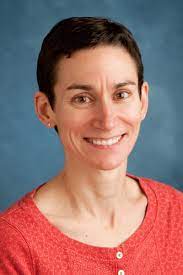
Sarah Krein, PhD, RN, VA Health Services Research and Development (HSR&D) Center for Clinical Management Research in Ann Arbor
ANN ARBOR, MI — Most VA researchers begin their research career because of a fascination with a certain clinical subject–a niche area usually discovered early in their studies that starts them off on a long, relatively straight, journey. Not for Sarah Krein, PhD, RN, who is interested in many subjects but none so deeply as the methodology of research itself.
A research career scientist at the VA Health Services Research and Development (HSR&D) Center for Clinical Management Research in Ann Arbor, Krein began her career as a nurse but realized after a couple of years that neither clinical care nor night shifts agreed with her, and so decided to go back to school for a PhD in health services policy and administration.
“After I finished my PhD, I was fortunate,” Krein explained. “I knew I just wanted to do research and had a connection with someone who was the director of a VA-funded research center in Ann Arbor and I got a position there.”
That position, along with a joint appointment at the University of Michigan, has allowed her to spend the last 26 years researching everything from patient safety to chronic pain (two of her biggest topics of interest) to diabetes care, acupressure and delivering care to veterans with dementia.
“It’s a strange portfolio of projects,” she admits. “As a health services researcher, I’ve got a good background in research methods, so I think of myself more as a methodologist than a content expert … I’m often in studies working with colleagues where the content is driven by something they’re working on. And I come in with my methodological expertise to use with these studies.”
For example, the principal investigator may have designed the project around mostly quantitative work, and Krein can bring a qualitative side to the analysis. Or the study leads might have set their sights a little too high, so Krein can help adjust the study’s goals to something more feasible.
“Sometimes people have really great ideas, but based on [my] experience I know that this might not be the ideal thing,” Krein said. “It might not be something we can do in the time frame or with the resources.”
And while Krein might not be able to cut through any red tape, she knows what hurdles researchers will have to leap and who can help them do it.
Workarounds Important
“Institutional knowledge can be helpful,” she explained. “Knowing the workaround as needed or at least knowing who to talk to. Who to talk to can be the most important thing.”
Over the years she has taken to some research subjects more strongly than others.
“I started working with different collaborators and got more and more interested in the topic we were studying,” she explained. “Patient safety is really interesting because it crosses a lot of different settings and different areas. … It’s critically important that the care we provide is not harmful in some way.”
“Chronic pain management is another, because it’s such a prevalent condition and affects so many patients, especially in VA,” she added. “It complicates care for other types of conditions as well. How can we address this very prevalent and challenging condition for patients while trying to improve care for other conditions they have?”
Despite 26 years of experience, projects still manage to provide new challenges. For example, she is part of a study kicking off later this year that will look at patients receiving outpatient parenteral antimicrobial therapy—a treatment that involves veterans giving themselves infusions at home.
“[These infusions] are a fairly challenging thing to do at home, and we want to learn from the patients themselves,” Krein explained.
The study will have the veterans take notes, provide photos, and use video to tell the researchers about their experience. It’s the most patient-centric study Krein has ever helped run and could provide a host of unique logistical issues. But she believes the potential outcome far outweighs the challenges.
“It’s a big safety issue and could improve the care we provide—learning from the people who have to do it,” she said.
Krein also has a portfolio of 16 mentees—early career researchers whom she is helping navigate the complex world of conducting medical research within a healthcare system. For that work, she received the 2022 HSR&D Daniel Deykin Award for Outstanding Mentor
“Over time, as I became more experienced, I had the extraordinarily good fortune in getting to work with a lot of clinicians who were early career investigators and wanted to become independent investigators,” Krein explained. “I became a mentor in career development … as well as in specific things around methodology.”
Many of her mentees have gone on to receive merit awards from VA that they use to fund studies of their own. Some then recruit Krein as a co-investigator on their own projects.
“It’s probably the most rewarding thing that I do,” she said. “I get to share what I know with these early career researchers. And I learn something new all the time in working with these folks in the way they think and the questions they ask. It makes me have to keep up with my own methodological skills.”
While her career as a health services research generalist has served her well, she admits it’s hardly typical, and not a straight or easy path.
“I tell my early career folks, don’t do this,” she said. “It’s not the way to build a career. I just fell into it, and I happen to love it.”
